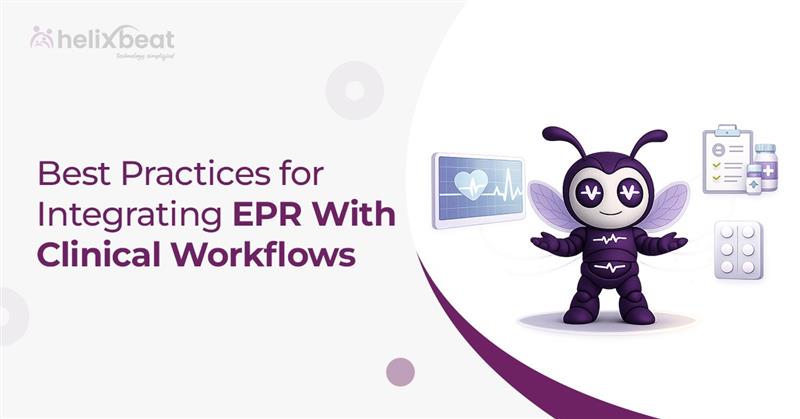Imagine running a business where everything just works—your systems run smoothly, data stays protected, and employees have the right tools to collaborate effortlessly. That’s the ideal scenario, but in reality, technology is unpredictable. Systems crash, security threats evolve, and software demands constant updates. Without proper IT support, even the most well-planned business operations can come to a halt.
That’s where IT services act as the silent force behind the scenes, keeping businesses functional and competitive. From maintaining secure networks to troubleshooting technical glitches and optimizing software performance, they handle the complexities so companies can focus on what they do best—growing and innovating.
But what exactly are IT support services, and how can they elevate business productivity? Let’s break it down.
Table of Contents
What Are IT Services?
IT services refer to the application of technology to support businesses in their operations, infrastructure, and security. These services include network management, cybersecurity, cloud computing, data analytics, technical support, and more.
Companies, regardless of their size, rely on IT services to streamline workflows, protect sensitive information, and improve overall efficiency. Now, let’s explore 20 ways IT support can drive business efficiency.
1. Minimizing Downtime
Downtime isn’t just an inconvenience—it’s a direct hit to productivity and revenue. A report from the Ponemon Institute in 2016 states that the cost of downtime is nearly $9,000 per minute, depending on factors such as company size and industry. Even for small businesses, the cost remains substantial, ranging from $137 to $427 per minute.
However, IT services play a crucial role in preventing these costly disruptions. By continuously monitoring networks, addressing potential vulnerabilities before they escalate, and keeping systems running smoothly, businesses can maintain operational efficiency.
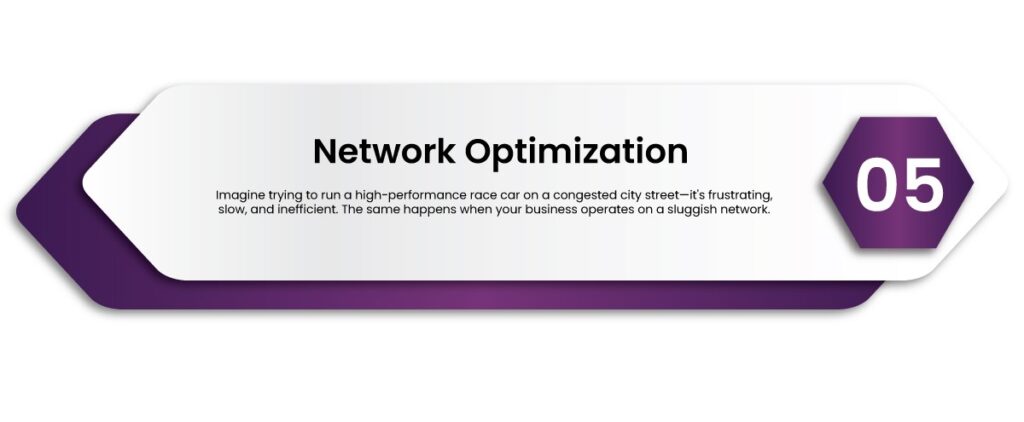
2. Strengthening Cybersecurity
Hackers and cybercriminals are constantly devising new tactics—whether through ransomware, phishing schemes, or zero-day exploits—targeting organizations of all sizes. According to Verizon’s 2021 Data Breach Investigations Report, approximately 46% of all cyber breaches impact businesses with fewer than 1,000 employees, with malware being the most common type of attack at 18%.
Therefore, IT services go beyond just installing firewalls and antivirus software. They implement multi-layered security strategies that involve real-time threat detection, continuous monitoring, and data encryption to shield sensitive information from unauthorized access. Advanced security protocols, such as multi-factor authentication (MFA) and endpoint protection, add extra layers of defense, which reduces the risk of breaches caused by weak passwords or unprotected devices.
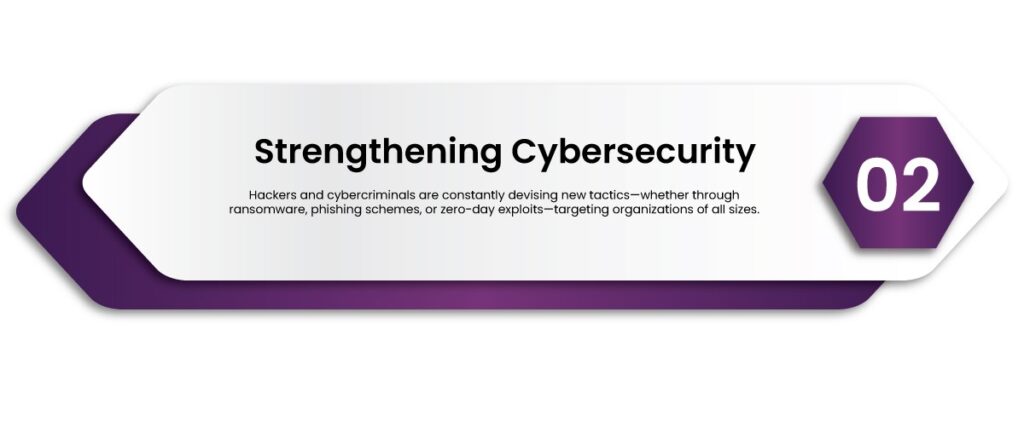
3. Cloud Computing for Scalability
With cloud-based services, businesses can expand or reduce their computing power as needed, paying only for what they use. IT services help organizations move their operations to the cloud with minimal disruption. Experts handle the migration of data, applications, and workflows, making them accessible from anywhere with an internet connection.
This shift not only cuts costs associated with on-premise infrastructure but also boosts collaboration and efficiency.
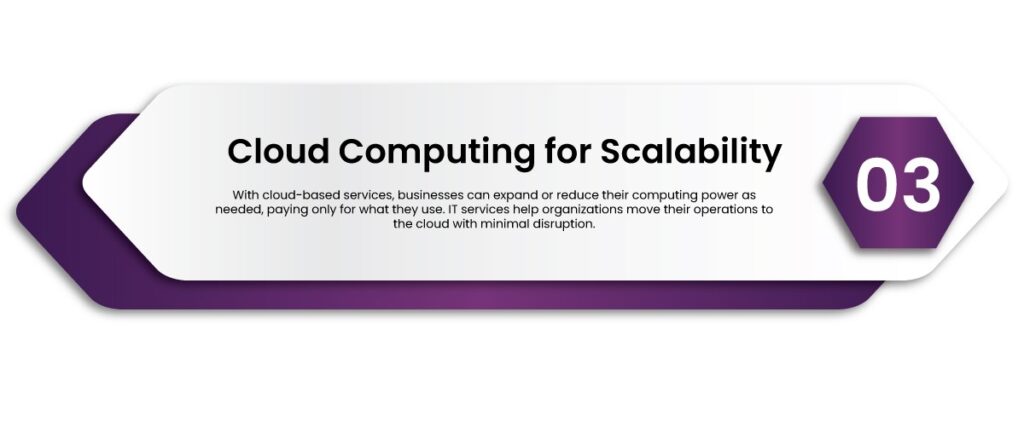
4. Data Backup and Recovery
IT services put in place automated backup systems that regularly copy and store data in secure locations, whether on cloud servers, off-site storage, or redundant hard drives. These backups act as a safety net, making it possible to retrieve lost information without significant delays. More than just storage, they implement structured disaster recovery plans that outline step-by-step procedures to restore systems swiftly after an unexpected event.
A well-designed recovery plan doesn’t just help retrieve lost files—it minimizes disruptions and keeps business operations running smoothly.
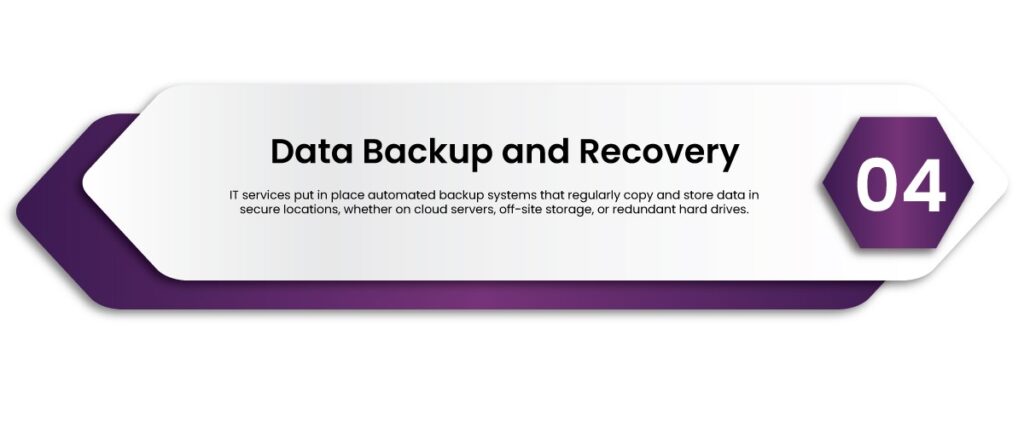
5. Network Optimization
Imagine trying to run a high-performance race car on a congested city street—it’s frustrating, slow, and inefficient. The same happens when your business operates on a sluggish network. Every second of lag, buffering, or downtime translates to lost productivity, delayed communication, and frustrated employees.
IT services fine-tune your network like a skilled pit crew, optimizing bandwidth allocation, configuring routers for peak performance, and identifying weak spots before they become roadblocks. They manage traffic flow, preventing bottlenecks that slow down critical business applications, video conferencing, and cloud services.

6. Improved Decision-Making with Data Analytics
Data analytics transforms decision-making from guesswork into a precise, strategic process. IT services provide businesses with the tools to sift through vast amounts of information and extract meaningful conclusions. For example, imagine a retail company using IT-powered analytics to track customer behavior. By examining purchasing patterns, seasonal trends, and customer feedback, the company can refine its product offerings, personalize marketing campaigns, and predict future demand more accurately.
Beyond retail, industries like healthcare, finance, manufacturing, and others also benefit significantly from data analytics.

7. Optimizing Software Performance
IT services keep software running at peak performance. By regularly updating applications, businesses gain access to the latest features, security enhancements, and performance improvements. Likewise, routine maintenance helps identify potential bottlenecks before they disrupt workflows.
Beyond updates, IT professionals troubleshoot technical glitches that can sap productivity. Whether it’s fixing a bug that causes frequent crashes, optimizing databases for faster queries, or streamlining integrations between different platforms, these improvements collectively boost efficiency.

8. Automation of Repetitive Tasks
IT services can reshape daily workflows and help businesses operate with greater speed and precision. For example, in finance departments, automation can handle invoicing by automatically pulling transaction details, sending reminders for overdue payments, and updating financial records in real time.
By automating repetitive tasks, organizations can eliminate human error, reduce processing time, and free up valuable human resources for higher-impact work.
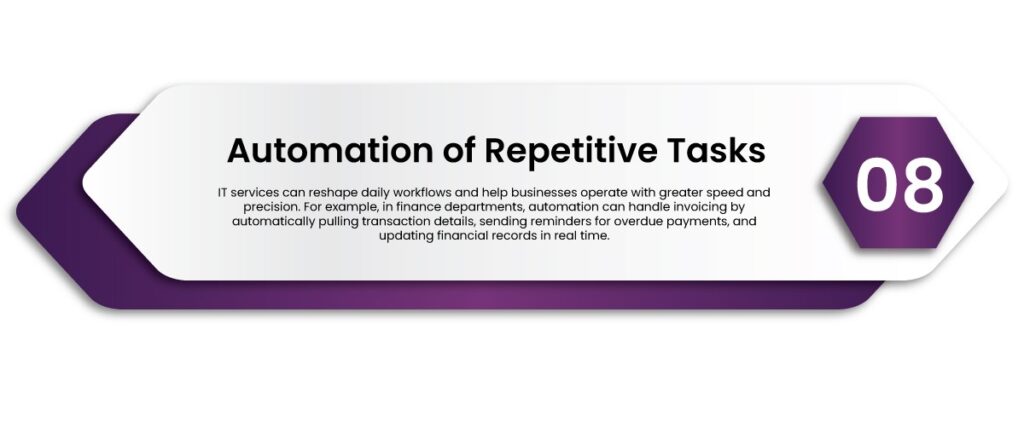
9. Compliance with Industry Regulations
Whether it’s the HIPAA governing patient information in healthcare, or PCI DSS standards for financial transactions, compliance is not optional—it’s a fundamental aspect of running a modern business. However, IT teams help businesses align their operations with industry requirements by integrating data encryption, secure access controls, automated compliance monitoring, and structured audit processes.
Additionally, regular security assessments and penetration testing help businesses uncover vulnerabilities before they become compliance risks.
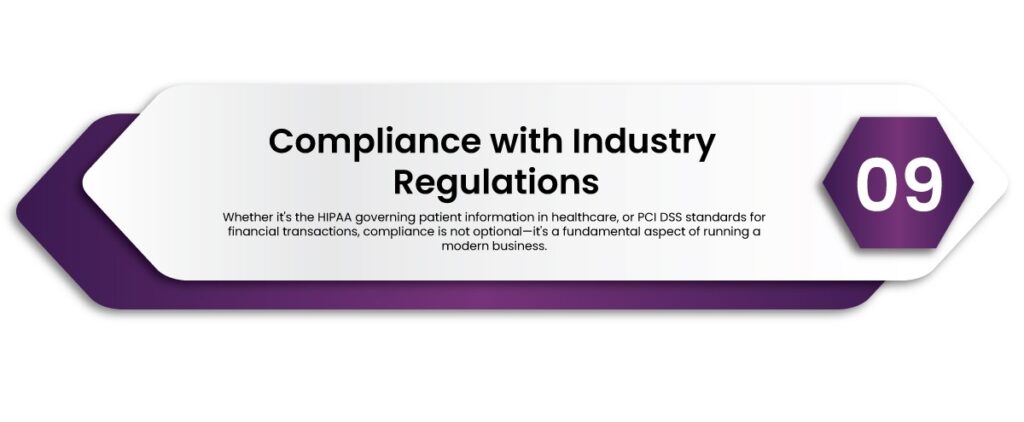
10. Future-Proofing Your Business
IT services help businesses stay ahead by adopting emerging technologies, from blockchain to IoT, keeping operations relevant and competitive.
However, staying ahead in technology isn’t just about adopting the latest trends—it’s about making informed choices that align with long-term goals.
With expert IT guidance from Helixbeat, businesses can navigate the intricacies of digital transformation, identify the right tools for their needs, and create scalable solutions that adapt as new innovations emerge.

Final Words
Investing in IT services not only optimizes daily operations but also prepares businesses for future challenges. With the right IT strategy, companies can focus on growth, innovation, and customer satisfaction, rather than worrying about technical disruptions.
Helixbeat offers cutting-edge IT solutions tailored to enhance your business efficiency and scalability. Contact us today to discover how our expertise can help you stay ahead in a rapidly evolving digital landscape.
FAQs
1. How can IT support help reduce downtime in a business?
IT support teams monitor systems, identify potential issues before they escalate, and implement solutions to prevent disruptions that could impact productivity and revenue.
2. How does cloud computing contribute to business scalability?
Cloud computing allows businesses to scale resources up or down based on their needs while reducing the costs associated with maintaining on-premise infrastructure.
3. How do IT services help businesses adapt to new technology trends?
IT professionals at Helixbeat guide businesses in adopting emerging technologies like AI, blockchain, and IoT for smooth transitions and long-term growth.
4. What cybersecurity measures do IT services provide to protect businesses?
Helixbeat IT services implement multi-layered security strategies to prevent cyber threats, including firewalls, real-time threat detection, data encryption, and multi-factor authentication.
5. What role does data backup and recovery play in IT services?
Data backup and recovery solutions create secure copies of business data, allowing for quick restoration in case of accidental loss, cyberattacks, or system failures.








